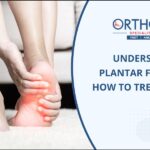Causes:
- plantar fasciitis.
- constantly being on your feet, especially on a hard surface like concrete and wearing hard-soled footwear.
- thinning or weakness of the fat pads of the heel.
- injury to the bones or padding of the heel.
- arthritis in the ankle or heel (subtalar) joint .
- irritation of the nerves on the inner or outer sides of the heel.
- fracture of the heel bone (calcaneum) .
The function of the heel in walking is to absorb the shock of your foot striking the ground as it is put down and to start springing you forward on the next step. It contains a strong bone (the calcaneum). Under the bone are a large number of small pockets of fat in strong elastic linings, which absorb much of the shock (fat pads). The heel is attached to the front of the foot by a number of strong ligaments which run between the front part of the calcaneum and various other parts of the foot. The strongest ligament is the plantar fascia, which attaches the heel to the toes and helps to balance the various parts of the foot as you walk. It, therefore, takes a lot of stress as you walk.
In some people, the plantar fascia becomes painful and inflamed. This usually happens where it is attached to the heel bone, although sometimes it happens in the mid-part of the foot. This condition is called plantar fasciitis. There are a number of common causes:
- It is due simply to constant stress and is, therefore, commoner in people who spend all day on their feet or are overweight.
- stiffness of the ankle or tightness of the Achilles tendon increases the stresses on the heel. Most people with plantar fascitis have a rather tight Achilles tendon.
- people who have high-arched (“cavus”) feet or flat feet are less able to absorb the stress of walking and are at risk of plantar fascitis
- sometimes it starts after an injury to the heel.
- people who have a rheumatic condition such as rheumatoid arthritis or ankylosing spondylitis may get inflammation anywhere a ligament is attached to bone (enthesopathy), and plantar fascitis in these people is part of their general condition.
- Usually, plantar fascitis eventually gets better itself, but this can take months or even years. If you have it once you are more likely to get it again.
Heel Pain Treatment:
Intralesional injections in the ankle & heel have been found to provide significant pain relief in cases where medicines haven’t worked. Such interventional techniques should be followed by regular stretching and exercises for better results.
Dr. Chetan Oswal is a well-known expert in foot and ankle problems as well as a heel pain specialist in Pune. He provides the most effective heel pain treatment in Pune. He graduated (MBBS) with honors from the prestigious BJ Medical College Pune in the first year. He has been working as a dedicated foot and ankle orthopedic heel pain surgeon in Pune for the last 12 years. He has successfully treated patients, including elite athletes, for virtually all foot and ankle problems. If you are suffering from heel pain, you should see Dr. Chetan Oswal, an expert heel pain doctor in Pune.
Our Services
Book Appointment
Book Your Appointment Today
We welcome your questions Do you have questions regarding your own situation? Do you actually want to resolve your problem and not just temporarily cover up the pain?




